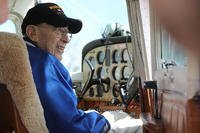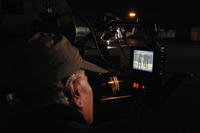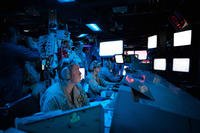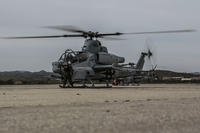CORONADO, Calif. -- It is the Navy's mission to defend the United States and its citizens, and to do so, it requires real-life and precise training on land, in the air and at sea. The Navy is also an active participant in the mission of protecting the environment and the species that live in it.
The Navy has taken proactive steps to minimize the effects of their activities on environmental resources and on threatened and endangered species. They support conservation through management programs.
The California least tern and western snowy plover, both federally listed as endangered birds, are two examples of the success of these programs, with their habitat sharing the same beaches the military uses for amphibious training and landings.
"The Navy does a lot to protect the birds," said Tiffany Shepherd, wildlife biologist for Naval Base Coronado. "We do annual site maintenance to clear non-native vegetation to enhance the nesting habitat, intensive monitoring to look for the birds on the beach and predator management to keep away other species who try to eat these birds."
Over the years, the conservation programs have been deemed successful and bird populations have increased.
"This year, we did a big habitat restoration on the Silver Strand Training Complex North, south of Naval Amphibious Base, Coronado," said Shepherd. "We mitigated for nesting habitat and took out about 16 acres of non-native ice plant, which covers the dunes, and planted native dune plants that they prefer."
California least terns and western snowy plovers lay their eggs in shallow depressions in the sand. The eggs and chicks are sand-colored to protect them from predators, yet this coloring makes them more vulnerable to accidental disturbance from human activity.
Shepherd said it is important for the public to know the beaches need to be kept clean and the birds need their space because of their sensitivity to disturbance.
The Navy has established procedures to protect these vulnerable nests and chicks through management practices and partnering consisting of beach cleanups and maintenance. Predators are either relocated to an unoccupied area or decoys are set up to deter them.
"We have partnered with San Diego State Soil Ecology and Restoration Group for the dune restoration, San Diego Zoo Global for bird monitoring and the Institute for Wildlife Studies for predator management," said Shepherd.
To inform the public, informational signs are posted along beach nesting areas of the California least tern and western snowy plover. These signs are used to educate the public on the birds and discourage disturbance in the area.
All these programs and efforts do not go unnoticed. This year, Naval Base Coronado received the U.S. Fish and Wildlife Service Military Conservation Partner award. The award is given to one stateside military base per year, and recognizes the installation whose efforts represent significant conservation.
"I am very proud of what the Navy does for the conservation of these species," said Shepherd. "Their efforts for these species are making a huge impact for their future recovery, which is our goal, to get them off the endangered species list."
Naval Base Coronado Helps Protect Endangered Birds
© Copyright 2024 Navy News. All rights reserved. This material may not be published, broadcast, rewritten or redistributed.





























